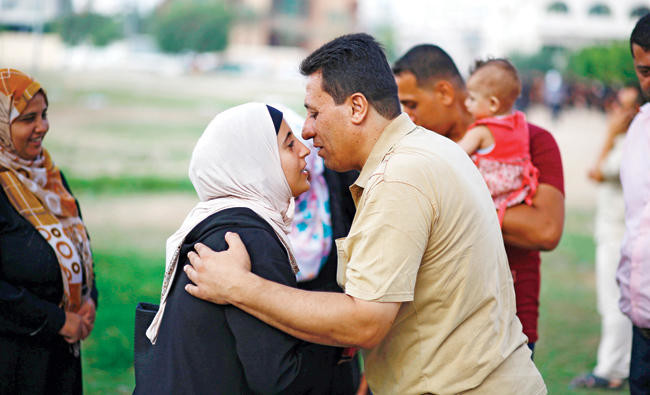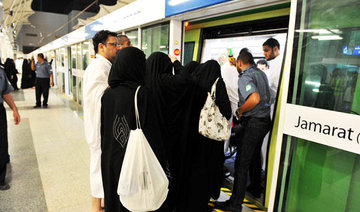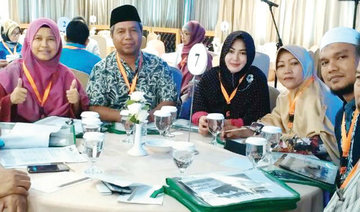AMMAN: For the besieged Gazan population, the Hajj season is a godsend. Muslims fortunate enough to be chosen for the pilgrimage leap at the opportunity to escape the prison they have been stuck in for a decade.
Saudi Arabia normally grants one Hajj visa for every 1,000 Muslims in a country. With Palestine having a population of less than 7 million, the annual permits given to applicants from the West Bank (including East Jerusalem and Gaza) to travel to the holy places in Makkah and Madinah are about 6,500. Gazans, who make up 40 percent of the overall Palestinian population under occupation, are entitled to 2,500 visas.
The Palestinian minister of Awqaf said that this year’s Hajj consists of 2,640 pilgrims from Gaza. This number includes 1,000 relatives of those killed by Israeli forces, who will go as the guests of King Salman.
Qadaffi Al-Qatati, a senior official at the Islamic Waqf Ministry in Gaza, told Arab News that the problem is how to decide who gets to go. “When we opened registration for the Hajj in 2010, over 30,000 applied. For them this was a chance to leave the besieged Gaza Strip, even for a short time.”
The large number of applicants forced the ministry to make the choice by lottery. The problem was what to do in the next year with those who were not chosen, so it was decided to carry on randomly selecting people for seven years in a row.
“While this allowed people to know which year they would go on Hajj, it caused other problems for those whose livelihood, and therefore their ability to pay the cost of the Hajj, changed,” Al-Qatati said. At the same time, he explained that if they allow new registrations, they might get as many as 100,000 people applying.
Gazans have been unable to enjoy Umrah, which is the off-season pilgrimage, for the past three years because of the near-permanent closure of the Rafah crossing by the Egyptian authorities, allegedly due to security concerns.
Over the years, other problems have occurred. Some would-be pilgrims have become sick and even died, while others simply lost interest or were no longer able to pay the costs. “We introduced a substitute system where next of kin are allowed to take the place of their relative who is sick, unable to travel or no longer living,” said Al-Qatati. “If that failed, we would go back to the lottery to make the choice of who can go instead.”
While the system seems to have worked, the journeys to Makkah and Madinah were not so easy. While some 75 tour agencies are registered by the ministries of tourism and Waqf to arrange the trips, the bigger problems lie with the border authorities. Average costs of the trip – including buses, round-trip airplane costs and accommodation in Makkah and Madinah – are about $3,000 per person.
In earlier years, Hajj applicants used to be able to take charter flights from the nearby Al-Arish Airport direct to Makkah, but the violence in Egypt since the Arab Spring has made the airport unusable. Instead, pilgrims have to spend two to three days on the road and in airport lounges waiting to get on the plane.
While there are long delays on the Egyptian side of the border, the biggest delay is on the way back. Travelers told Arab News that the Egyptian authorities, who confiscate passports in both directions, wait for all the planes bringing Gaza passengers back to arrive first and get through passport control, before allowing the bus convoy – often as many as 16 large buses – to proceed to the Rafah crossing.
Hajj ‘a gift from heaven’ for Gazans
Hajj ‘a gift from heaven’ for Gazans

Japan hopes to attract more Saudi travelers through exhibitions in Kingdom

DUBAI: As Japan and Saudi Arabia approach their 70th anniversary of diplomatic relations, the Japan National Tourism Office is planning more exhibitions to attract Saudi travelers, the organization’s Dubai executive director Daisuke Kobayashi said.
Kobayashi told Arab News Japan that JNTO hopes to maintain “strong partnerships” with local travel agencies and related organizations.
“Through these collaborations, we aim to deliver more comprehensive and engaging information to Saudi travelers, encouraging them to discover the unique experiences Japan has to offer,” he said.
There are as yet no plans to open a JNTO office in Saudi Arabia, Kobayashi said. However, he confirmed that the organization will continue its promotional activities in the Kingdom to meet the growing interest in Japan from Saudi travelers.
In December 2024, JNTO held its first event in Riyadh, titled “Feel Your Four Seasons.”
The exhibition provided visitors with an introduction to Japan’s diverse seasonal attractions, including luxury travel experiences.
Kobayashi told Arab News Japan that since the event, JNTO had observed a “significant increase in Saudi travelers’ interest in visiting Japan.”
“During the event, we noted a strong desire among attendees to travel to Japan, particularly in the spring to experience cherry blossoms,” he said. “We also noticed growing curiosity about Japan’s summer and winter offerings. Visitors showed interest in natural landscapes, summer festivals, and winter activities such as enjoying snow-covered scenery.”
Expo 2025 Osaka, Kansai in April is also a big tourist attraction for Saudi and GCC travelers.
According to Kobayashi, travelers from the region are usually most interested in traditional Japanese accommodations such as ryokan (Japanese-style inns), which often include onsen (hot spring) experiences and authentic Japanese cuisine.
Anime and manga’s popularity in the Middle East is also a key reason why Arab travelers choose Japan for a vacation.
From a cultural aspect, Kobayashi said that Japanese and Arab cultures share similar values, which can help to put Saudi travelers at ease.
“The cultural parallels create a sense of familiarity and comfort for travelers from Saudi Arabia and the broader GCC region when visiting Japan,” he said. “Whether it’s exploring Japan’s traditional tea ceremonies, staying in ryokan, or simply interacting with the warm and respectful Japanese hospitality, these experiences resonate deeply with visitors from Saudi Arabia.”
According to Kobayashi, in the first half of 2024, there was a 72.2 percent increase in visitors from Saudi Arabia to Japan, compared with the same period in 2023.
Saudi FM meets US envoy to discuss developments in Lebanon

- Explored collaborative efforts to address challenges facing Lebanese people and in broader region
RIYADH: Saudi foreign minister Prince Faisal bin Farhan met with Amos Hochstein, the US Special Envoy to Lebanon, on Sunday at the Ministry of Foreign Affairs headquarters in Riyadh.
The meeting focused on regional issues, with particular attention given to the situation in Lebanon, the Saudi Press Agency reported.
Both sides exchanged views on recent developments and explored collaborative efforts to address the challenges facing the Lebanese people and the broader region, SPA added.
Also in attendance was Prince Yazid bin Mohammed bin Fahd Al-Farhan, advisor to the Minister of Foreign Affairs for Lebanese Affairs, who contributed to the discussions.
Saudi leadership offers condolences after death of Jordan’s Princess Majda

- Princess Majda passed away in Amman on Jan. 3, the Royal Hashemite Court said
- Swedish-born princess was born Margaretha Inga Elisabeth Lind and became known as Princess Majda after her marriage.
RIYADH: Saudi Arabia’s King Salman and Crown Prince Mohammed bin Salman sent cables of condolences to the king of Jordan after the passing of Princess Majda Raad, Saudi Press Agency reported on Sunday.
Jordan’s King Abdullah attended the funeral of Princess Majda, the wife of Prince Raad bin Zeid, at the Royal Cemetery on Friday, The Jordan Times reported.
Princess Majda passed away in Amman on Jan. 3, the Royal Hashemite Court said. The Swedish-born princess was born Margaretha Inga Elisabeth Lind and became known as Princess Majda after her marriage.
New community initiative brings Saudi artisans together for ‘Year of Handicrafts’

- Workshops held for aspiring artisans and crafters
- Events will be held throughout the year
RIYADH: The Royal Institute for Traditional Arts launched a new community initiative on Saturday with a packed day of workshops and discussions with inspiring figures in the handicrafts field.
As 2025 kicks off with the Ministry of Culture labeling it the “Year of Handicrafts,” TRITA aims to bring a sense of camaraderie to artisans and aspiring crafters with its “Wrth Community,” which will host several events through the year.

Nermeen Al-Naimi, an artisan at TRITA, told Arab News: “Today, the community of Wrth started, so that’s very good for artisans because we are looking for somewhere we can belong.
“Wrth is the place we belong now with this community, it’s more like a second house for us because we exchange experiences, we exchange techniques and tools and stuff like that. It’s a growing kind of family, so we’re happy that they made this step today, and we’re grateful.”

(AN photos by Abdulrhman Bin Shalhoub)
The six-hour event brought artisans at various levels and from various crafts together for a day of engagement through workshops on traditional crafting with wood, metals, clay, and stones.
Silversmiths Ayat Dhahi and Revan Abdulsabour shared their expertise on sculpting and formation, from design to implementation, while others, such as sculptor Helwa Al-Atawi, shared success stories of turning a passion into a career.

Jewelry designer Rughad Al-Hogail weighed in with her entrepreneurial experience of taking local crafts to international markets.
Al-Naimi is an instructor for jewelry manufacture and design, but came to the inaugural Wrth event as a student, signing up for a wood-carving workshop that allows participants to identify the types of traditional engravings in the Najd region, and producing a wooden coaster using the technique with a copper inlay.

“I decided to go back to wood because I did clay before, and I did metals before, so I wanted to incorporate wood in my designs …
“It has metal in it, so, the experience was amazing because I use metal combined with wood, combined with a little bit of this technique.”

Other workshops explored traditional engraving methods, their use in the manufacture of innovative products, and employing traditional engravings in contemporary art.
Al-Naimi works as a personal branding consultant, and part of her job is to help individuals realize their hopes and connect with ways to energize themselves.

“One of the things that makes me happy is working with my hands. So working with metal, with wood, it’s all a stress relief. Plus you make something beautiful.”
Al-Naimi joined TRITA about two years ago, working with metals, but quickly found that it was more than just a space to create.
“Here at the Royal Institute, it’s support all the way — for the trainers, for the products; they have an online store now,” she said. Here students’ creations are up for sale at the physical location and online, creating profitable opportunities for aspiring and established artisans.
Wrth Community aims to lead the revival and development handicrafts, linking them to modern design and technology, enhancing the participation of institutions and the local community to highlight the importance of traditional arts in defining cultural identity, while also equipping people with ways to create traditional arts in today’s market.
Wrth Community provides opportunities for artisans to meet, exchange knowledge and enhance personal and professional skills with a focus on education, crafts, entrepreneurship, and dialogue sessions. By creating a supportive environment, TRITA hopes to stimulate talent and creative individuals to learn and practice traditional arts and crafts.
TRITA is a pioneering organization that highlights the national identity and enriches Saudi traditional arts locally and globally, promoting them and recognizing pioneers in the fields of traditional arts. This contributes to the preservation of traditional arts by supporting national capabilities and talents while encouraging those interested in learning, mastering and developing them.
KSrelief and UNHCR officials discuss enhanced humanitarian support in Syria

- An estimated 6.8 million Syrians remain displaced within the country, while more than 5.5 million have sought refuge in neighboring countries
DAMASCUS: Officials from the King Salman Humanitarian Aid and Relief Center and the UN High Commissioner for Refugees met in Damascus on Sunday to discuss coordinated efforts to assist the Syrian people, the Saudi Press Agency reported.
The meeting, focused on bolstering humanitarian and relief operations in the region, was attended by Abdullah bin Saleh Al-Harees, charge d’affaires of the Saudi Embassy in Syria.
During the discussions, UNHCR officials praised their strategic partnership with KSrelief, highlighting the importance of their joint initiatives to support refugees and displaced persons in Syria.
Both parties also reiterated their commitment to ensuring that vulnerable populations have access to essential resources and services to live with dignity.
The humanitarian crisis in Syria remains one of the most pressing in the world, especially after the fall of Bashar Assad’s regime in December of last year, following over a decade of civil war.
Assad’s ouster came after years of intensified international sanctions and a lightning offensive across key cities by opposition militias, culminating in his government’s collapse.
An estimated 6.8 million Syrians remain displaced within the country, while more than 5.5 million have sought refuge in neighboring countries such as Turkiye, Lebanon, and Jordan.
Humanitarian organizations like KSrelief and UNHCR play a crucial role in addressing these challenges, providing essential aid such as food, shelter, and medical care.
In Syria, UNHCR has been a critical player in responding to the humanitarian crisis, assisting the millions of displaced Syrians and advocating for sustainable solutions to their plight. Its collaboration with partners such as KSrelief has been key to addressing the evolving needs of those affected by the conflict.
On Sunday, Fadi Al-Qasim, the Syrian Minister of Administrative Development in the transitional government, met with the KSrelief team in Damascus in the presence of Al-Harees.
During the meeting, they discussed strategies for delivering relief aid to support the Syrian people and civil society.
Al-Qasim expressed his gratitude to the KSrelief team for their generous assistance and praised the urgent humanitarian aid provided by Saudi Arabia to Syria.






















